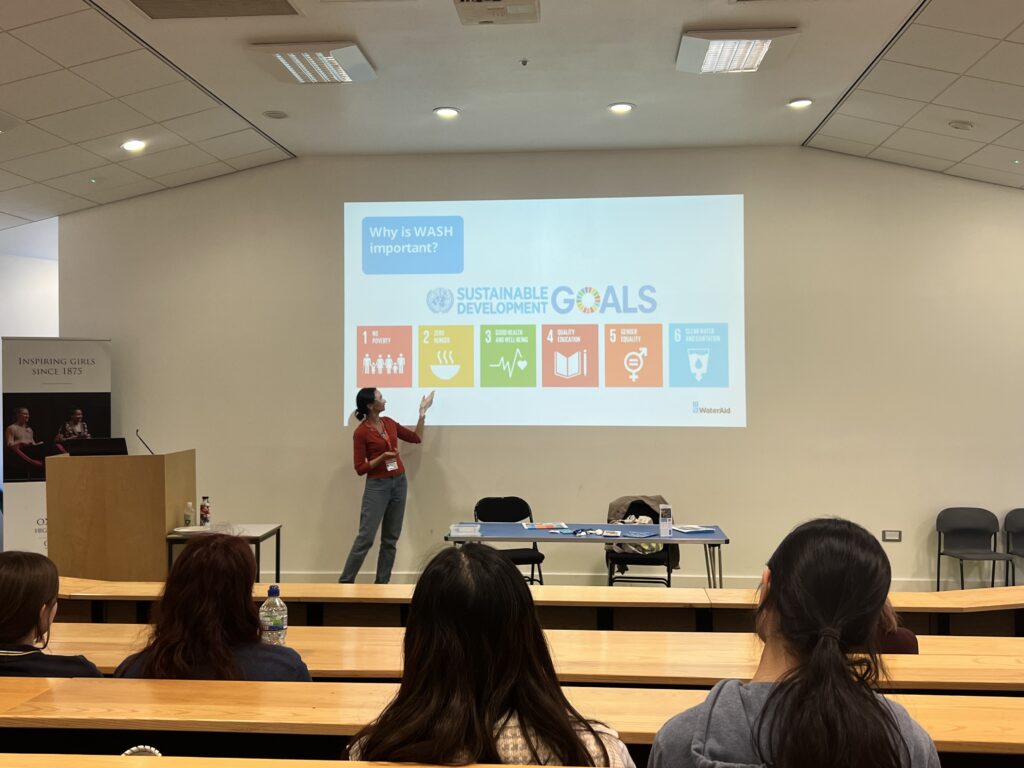Written by Maya, Year 10
On Monday the 13th of June, we were visited by Aurélie Crawford from WaterAid’s ‘Volunteer Speaker Network’. Having been kind enough to travel all the way to meet us in person, Aurélie helped us to understand the challenges faced by those people who WaterAid strives to help.
We were provided with some shocking statistics. For example, 1 in 9 people in the world live without clean water even close to their home; more than 1 in 3 people don’t own a clean and therefore safe toilet – globally, more people own a mobile phone than a toilet! As a consequence, 1 child dies every 2 minutes from a disease caused by poor hygiene due to the lack of these necessities. The problem is most prominent in LICs (Low Income Countries) such as Tanzania. While WaterAid has reached tens of millions of people, hundreds of millions still live without WASH (water, sanitation and hygiene).
Factors affecting the situation include taboo around the subject, governmental policies, extreme poverty, and geographical or natural misfortunes. The taboo and stigma that surrounds the topic of latrines and physical human health, especially gender-wise, stems mainly from the expectations of outside eyes. It is not uncommon for states in Northern India to have a rule that women are not allowed to relieve themselves between 5am and 9pm. This is because the poor-quality outdoor toilets provide no privacy, and women are expected to be more modest than men are and so the cover of darkness is the only form of privacy available. There are two major impacts of this. The first is that having to hold it for so long forces women to restrain from food and drink and therefore risking severe dehydration, UTIs and RTIs and sometimes fertility problems. We all know how uncomfortable or even painful it is to be in the car with no available bathroom and to be completely and absolutely desperate – now imagine having to do hard labour at the same time.
The second impact is that the darkness of the night invites lurking voyeurs who make going to the toilet a dangerous feat, forcing a woman to risk harassment or even rape. Professor Isha Ray said in a talk that “the minute it gets dark you are at risk of stray dogs, stray snakes and stray men”. The fact that men and women have different needs, dignity and modesty results in women being only allowed to go during the night whereas the same rules do not apply to men. Temples even forbid the entrance of women on their period as it is seen as dirty. Governments focus their limited resources on other crucial things like better quality education or reduced unemployment. Unfortunately, these are all but impossible to achieve without first addressing other key issues like gender roles. 1/10 young girls regularly skip school to walk for hours in search of water (imagine having to do DofE without breaks every day just to keep your family alive, and the suitcase-weight bucket of filthy water you collect may even do you more harm than good).
In Madagascar, people spend 45% of their wages on safe drinkable water – a human right! Before you start feeling too hopeless though, global sustainability goals are seeking to improve things. These include “Goal 6” which refers to water and sanitation; its aim is that by 2030 everyone will have access to clean and safe drinking water. This is arguably the most important goal, as without it you cannot sustainably implement any of the other goals. What is urgently needed is infrastructure such as sewage systems and new wells otherwise people will continue to drink the contaminated water that they also use as a community toilet. For this to become a reality, great social investment and sacrifice is essential and it needs to become a priority for governments worldwide to help one another as the lack of help keeps the poor poor and fuels this vicious cycle.
Although many NGOs are still hugely effective and essential, their marketing campaigns can tend to cause harm by propagating stereotypes about race and its link to poverty by not providing the context needed. This is why the charity WaterAid is very aware of their marketing methods. The work that they do is not only on the technological side of things but also collaboration with policy makers in order to spark change right from the roots.
If you would like to get involved, there are many options to choose from in order to find a method that best suits you. You can be a speaker (like Aurélie), fundraise, campaign, or to donate you can scan this QR code:
£12 can buy a handwashing bucket stand in Southern Africa, £120 can pay to train one person to maintain a water pump in West Africa and £2,200 can fund the installation of a school water system in Asia. Don’t be part of the people who talk the talk. Be one of the ones who walk the walk.

